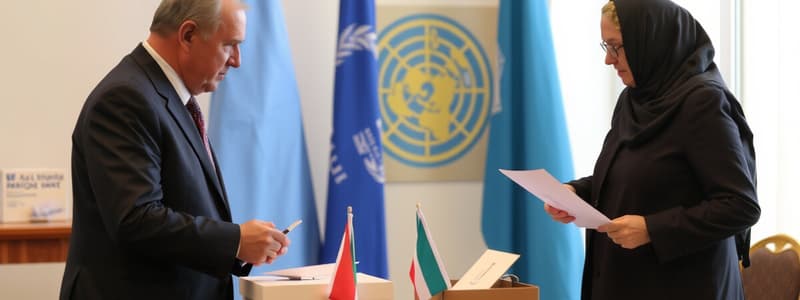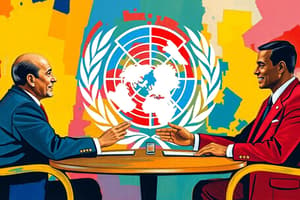Podcast
Questions and Answers
What role does the DPPA play in relation to peacekeeping operations?
What role does the DPPA play in relation to peacekeeping operations?
- It is responsible for high-level political decision-making at UNHQ.
- It formulates sanctions against non-cooperating states.
- It supports elections in post-conflict countries and provides policy guidance. (correct)
- It conducts military operations in conflict zones.
Which statement accurately describes the levels of decision-making in UN peacekeeping?
Which statement accurately describes the levels of decision-making in UN peacekeeping?
- Strategic authority manages the day-to-day military work.
- Operational and tactical levels are both based at UNHQ.
- Operational authority is responsible for high-level political decision-making.
- Tactical authority oversees the management of military and police operations. (correct)
What is the significance of a mandate in UN peacekeeping?
What is the significance of a mandate in UN peacekeeping?
- It serves as a recommendation for potential intervention.
- It is the authorization for actions or tasks, including the use of force. (correct)
- It defines the operational budget for peacekeeping missions.
- It outlines the recruitment process for peacekeeping personnel.
Which of the following statements about UN membership is true?
Which of the following statements about UN membership is true?
What does the UN Charter primarily outline?
What does the UN Charter primarily outline?
What is the primary function of the UN Security Council regarding international conflicts?
What is the primary function of the UN Security Council regarding international conflicts?
What action can the General Assembly take under Resolution 377(V) when the Security Council fails to act?
What action can the General Assembly take under Resolution 377(V) when the Security Council fails to act?
Which type of action is NOT typically involved in preventive measures against conflicts?
Which type of action is NOT typically involved in preventive measures against conflicts?
What distinguishes peace enforcement from peacekeeping?
What distinguishes peace enforcement from peacekeeping?
How are contributions to UN peacekeeping operations determined?
How are contributions to UN peacekeeping operations determined?
Flashcards are hidden until you start studying
Study Notes
UN Peacekeeping and Political Functions
- Special Political Missions (SPMs) can take various forms, including political field offices, special envoys, and expert panels for monitoring sanctions.
- The UN facilitates dispute resolution among states through its good offices.
- The Department of Political and Peacebuilding Affairs (DPPA) oversees peacemaking and preventive diplomacy efforts.
- DPPA assists post-conflict nations with elections, providing needs assessments, policy guidance, and specialized personnel to support peacekeeping operations.
Decision-Making Levels in UN Peacekeeping
- Three levels of decision-making exist:
- Strategic: high-level political decisions managed at UN Headquarters (UNHQ).
- Operational: management carried out at mission headquarters in the field.
- Tactical: day-to-day military, police, and civilian management below mission HQ.
United Nations Overview
- The UN was established in 1945, currently comprising 193 member states.
- One of the UN's primary goals is the maintenance of international peace and security, as stated in its Charter.
- The UN's core documents include the UN Charter, which outlines its purpose and structural components.
Peacekeeping Mandates and Resolutions
- A mandate is an authorization for a specific action, legally underpinning peacekeeping operations, including permissible force use.
- Resolutions serve as formal expressions of positions by UN principal organs.
UN Security Council Responsibilities
- The Security Council maintains international peace; it can intervene even in non-member states under certain resolutions.
- The "Uniting for Peace" resolution allows the General Assembly to act when the Security Council is deadlocked.
Funding of UN Peacekeeping Operations
- UN Peacekeeping Operations (PKOs) are funded through assessed contributions from member states, with larger shares assigned to permanent Security Council members.
Spectrum of Peace and Security Activities
- Peace and security actions aim to prevent disputes from escalating, mitigate relapse into conflict, restore peace, and build sustainable peace.
- Among various activities, only peacekeeping and peace enforcement may involve the use of force.
Conflict Prevention and Peacebuilding
- Conflict prevention involves proactive diplomatic efforts before conflicts start or when relapse risks exist.
- Peacebuilding focuses on creating lasting peace by addressing the root causes of conflict.
Peacekeeping Principles
- The three basic principles of UN peacekeeping remain: consent, impartiality, and non-use of force except in self-defense.
- Consent is crucial as it provides operational freedom and prevents peacekeepers from being parties in conflicts.
Credibility and Legitimacy in Peacekeeping
- The credibility of peacekeeping missions relies on effective management and managing the expectations of international and local communities.
- National and local ownership fosters engagement from local actors and enhances sustainability of peace efforts post-mission.
Conduct and Behavior of Peacekeeping Personnel
- High standards in mandate implementation, using force responsibly, zero tolerance for misconduct, and respect for local customs contribute to perceived legitimacy.
- Managing expectations involves being transparent and avoiding false promises to local communities.
Mission Structure and Coordination
- Different components of peacekeeping missions, including military, civilian, and police, work collaboratively towards the specified mandate.
- The Support component is responsible for logistics and administrative functions, enabling substantive components to focus on local assistance.
Leadership in Peacekeeping Missions
- The Special Representative of the Secretary-General (SRSG) in multidimensional operations is typically a civilian, not a military officer.
- The Chief of Staff (COS) works closely with the Head of Mission (HOM) and manages mission activities in alignment with strategic guidance.
Studying That Suits You
Use AI to generate personalized quizzes and flashcards to suit your learning preferences.




